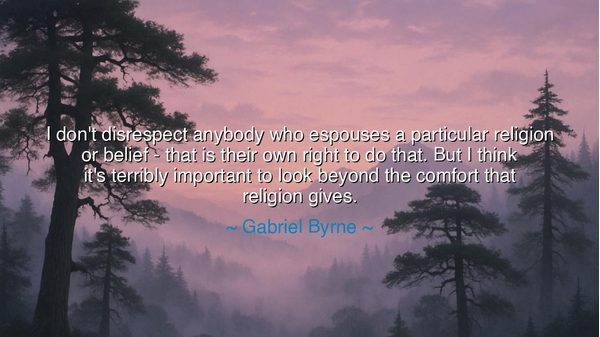
I don't disrespect anybody who espouses a particular religion or
I don't disrespect anybody who espouses a particular religion or belief - that is their own right to do that. But I think it's terribly important to look beyond the comfort that religion gives.






"I don't disrespect anybody who espouses a particular religion or belief - that is their own right to do that. But I think it's terribly important to look beyond the comfort that religion gives." – Gabriel Byrne.
In this thought-provoking statement, Gabriel Byrne offers a reflection on the nature of religion and its role in the life of the individual. He acknowledges the personal right to hold a belief system or faith, but he also urges us to look beyond the comfort that religion often provides. In essence, Byrne suggests that while faith may offer solace and guidance, it is equally important to venture beyond this comfort zone, to question, to expand our horizons, and to embrace a deeper, perhaps more challenging, understanding of life and existence. Religion, in this sense, is not a crutch to lean on but a tool for greater insight into the mysteries of the world.
The ancient philosophers often grappled with the role of belief in the human experience, and many of them warned against the comfort of unquestioned faith. Socrates, for example, spent his life challenging the accepted beliefs of the Athenian society. He famously said, "The unexamined life is not worth living." For Socrates, the quest for truth was not something that could be found by simply adhering to the dogmas and traditions handed down through generations. Instead, it was through questioning, doubt, and examination that true understanding was attained. Socrates believed that one must look beyond the comfort of commonly accepted beliefs, pushing the boundaries of one’s understanding.
Plato, his disciple, carried on this message, teaching that the realm of ideas, the higher reality, could not be fully understood through mere faith or comfort in the senses, but only through reason and philosophical inquiry. He warned that the shadows on the wall, those which people believed were reality, were merely reflections of a greater truth that could only be accessed by seeking knowledge beyond the familiar. This aligns with Byrne's message that while religion can provide comfort, it should never be used as an excuse to avoid the hard work of searching for deeper truths.
In history, we see many figures who, like Byrne, encouraged people to question the comfort of religion in order to seek something greater. Galileo Galilei, the great astronomer, found himself in direct conflict with the Church when he proposed that the Earth revolved around the Sun, not the other way around. His work was met with resistance, not because it was false, but because it challenged the comfort of a geocentric view of the universe, one long held by religious authorities. Galileo's courage to question and to look beyond the comfort of accepted beliefs ultimately led to a revolution in human understanding, showing that the pursuit of truth often requires sacrifice and a willingness to look beyond tradition.
The story of Martin Luther, the German theologian who sparked the Protestant Reformation, offers another example. Luther’s challenge to the Catholic Church, particularly his 95 Theses, was not a rejection of religion, but a call for deeper engagement with faith—a rejection of the comfort found in rituals and practices that he believed obscured the true essence of Christianity. Luther’s act of defiance was one of seeking a more authentic connection with the divine, one that went beyond the rituals and comforts that the Church provided. In this sense, Luther’s challenge was about looking beyond religious comfort to find something that resonated more deeply with the soul.
Byrne’s words remind us that comfort is often the enemy of growth. To remain comfortable in our beliefs is to remain stagnant, unchallenged, and blind to the vastness of life’s mysteries. True spiritual growth and intellectual development require that we step out of the cozy bounds of certainty and familiarity. By daring to question, to explore, and to embrace discomfort, we open ourselves to new experiences and deeper truths. It is through this journey—this willingness to step beyond the known—that we can truly evolve as individuals and as a society.
The lesson here is clear: we must not be satisfied with comfortable beliefs, whether they are religious, philosophical, or personal. While faith can offer strength and guidance, we must also question and explore beyond it, for it is in the unknown, the uncomfortable, and the challenging that true wisdom often lies. We are called not only to seek answers but to learn how to live with uncertainty, to embrace the search itself. Truth, in all its forms, is not simply handed to us—it is earned through the courage to look beyond what is familiar and comfortable.
In our own lives, we must strive to live with curiosity and humility, acknowledging that while religion and faith may provide a foundation, they should not be the final destination. Whether we are searching for spiritual truth, personal growth, or social justice, let us look beyond the comforts of the known, and dare to question, to explore, and to embrace the journey toward deeper understanding. This path, though often difficult and uncomfortable, is the one that leads us to true wisdom and authentic connection with the world around us.






AAdministratorAdministrator
Welcome, honored guests. Please leave a comment, we will respond soon